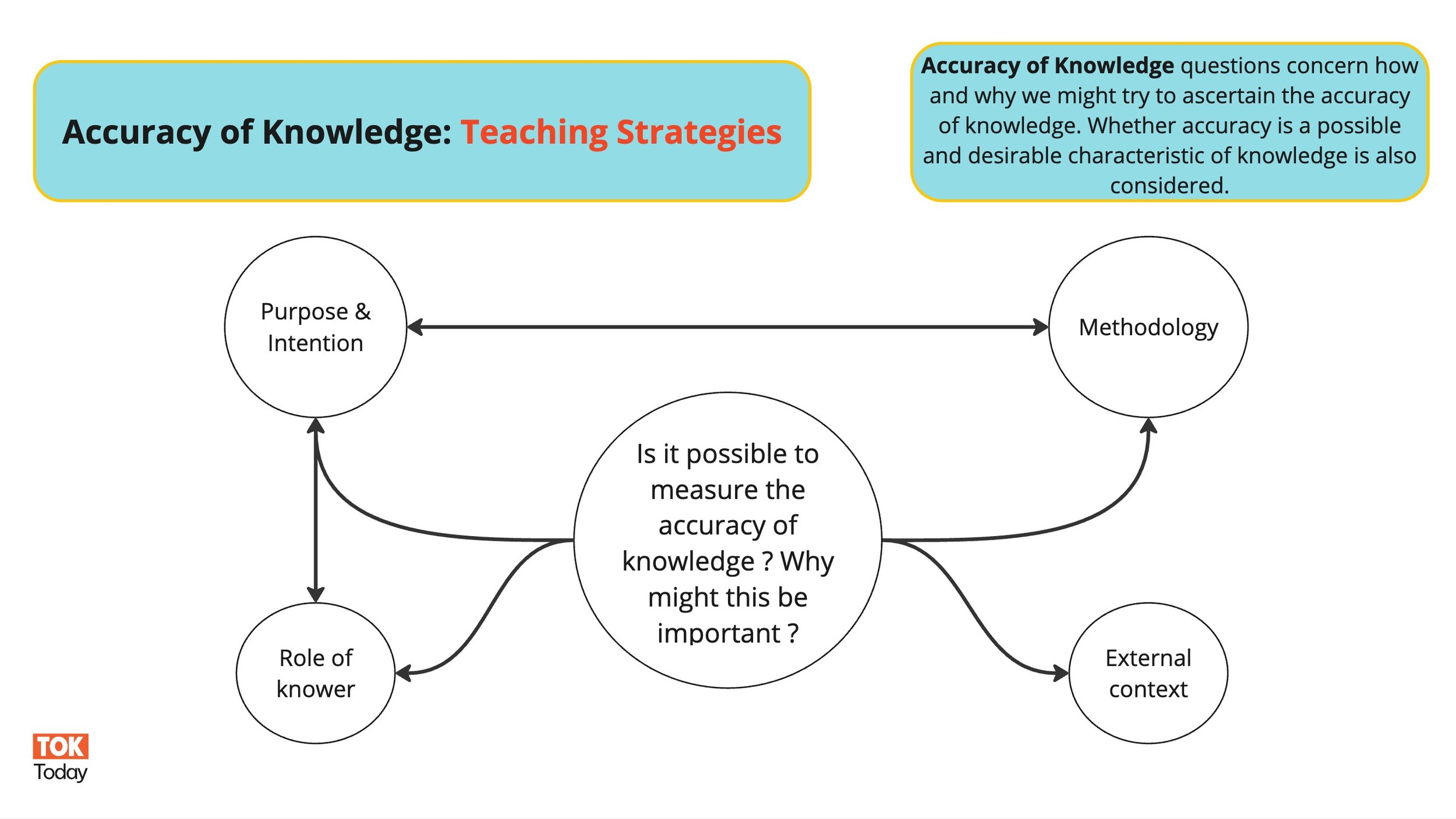Understanding Three Key Theory of Knowledge (ToK) Essay Question Types
In the previous post, I introduced a typology of five recurring question types that underpin all Theory of Knowledge (ToK) essay questions. If you missed that discussion, you can explore it here. Understanding these question types provides a structured lens through which both teachers and students can approach any ToK essay title.
In this post, we look more closely at the first three question types: Development of Knowledge, Accuracy of Knowledge, and Technology in the Production of Knowledge. I’ll provide examples of each type, unpack their underlying themes, and share practical teaching strategies to help students engage meaningfully with these questions.
Get all the slides from today’s post / video at this link (FREE!)
Watch this Blog Post as a video at this link.
ToK Essay Question Type 1: The Development of Knowledge
This category focuses on how knowledge evolves over time. Questions in this category challenge students to explore:
• Why and how knowledge develops.
• The factors that sustain or change knowledge.
• The relationship between knowledge and the methodologies used to construct it.
Examples
• November 2024, Q3: How might it benefit an area of knowledge to sever ties with its past?
This question invites students to consider the implications of breaking away from historical methodologies, assumptions, or paradigms in pursuit of progress.
• May 2023, Q6: To what extent is the knowledge we produce determined by the methodologies we use?
While focusing on methodology, this question inevitably requires students to explore historical shifts in methodologies and their influence on knowledge.
Teaching Strategies
To guide students in addressing these questions, consider framing discussions around:
• Central Questions: Does knowledge change over time? If so, why? Is knowledge supplemented, modified, or replaced?
• Key Factors: Discuss how the purpose of knowledge, the intentions of knowledge producers, methodological advancements, and external factors (e.g., cultural or societal values) influence knowledge development.
• Practical Examples: Link discussions to specific AoKs. For instance, examine how natural sciences have progressed through paradigm shifts or how artistic movements evolve in response to cultural and societal shifts.
ToK Essay question type 2: The Accuracy of Knowledge
Questions in this category centre on the concept of accuracy in knowledge. They engage students with concepts such as:
• Subjectivity and objectivity.
• Validity, reliability, and falsifiability.
• The relationship between accuracy and the purpose of knowledge production.
Examples
• May 2024, PT1: Is subjectivity overly celebrated in the arts but unfairly condemned in history?
This question requires students to evaluate the role and value of subjectivity in different AoKs and their respective purposes.
• November 2022, PT4: Why do we seek indisputable knowledge when it is so often unattainable?
Students are encouraged to grapple with the concept of indisputability, exploring its implications for reliability and the nature of knowledge itself.
Teaching Strategies
One engaging approach is to begin with a practical activity:
• Activity: Ask students to measure something seemingly simple, such as the height of a school building or the happiness of their peers. The inevitable range of results opens a discussion on inaccuracy and its implications for knowledge.
• Key Questions: Is it possible to measure the accuracy of knowledge? Why might this be important?
• AoK-Specific Discussions: Explore how accuracy is evaluated differently in natural sciences, human sciences, or history, linking these considerations to the purpose of knowledge production in each AoK.
ToK Essay Question type 3: Technology in the Production of Knowledge
This category examines the role of technology in shaping how knowledge is produced, disseminated, and understood. Students are encouraged to interrogate:
• The definition of technology.
• The interplay between technological advancements and knowledge production.
• Whether technology drives changes in knowledge or vice versa.
Examples
• May 2024, Q4: Do we underestimate the challenges of taking knowledge out of its original context and transferring it to a different context?
Although not explicitly about technology, the question becomes more accessible when viewed through the lens of technological tools that facilitate or hinder knowledge transfer, such as AI, social media, or historical examples like the printing press.
• November 2023, Q6: Faced with a vast amount of information, how do we select what is significant for the acquisition of knowledge?
This question invites students to consider the role of technology in managing information and the criteria for determining its significance.
Teaching Strategies
To help students explore this question type:
• Practical Activities: Use AI-generated content, digital tools, or reapplications of simple technologies (e.g., combining physical tools like newspapers and straws) to illustrate how technology influences knowledge production.
• Core Questions:
• Is technology inevitable or necessary for knowledge production?
• Does technology shape knowledge, or does knowledge shape technology?
• What is the relationship between humans and machines in producing knowledge?
• Philosophical Context: Engage students with philosophical perspectives, such as Heidegger’s exploration of technology’s role in shaping human understanding.
Final Thoughts
By understanding these three types of ToK essay questions—Development of Knowledge, Accuracy of Knowledge, and Technology in the Production of Knowledge—teachers can help students to better understand how to respond to ToK Essay questions.
These categories provide a lens through which students can interpret questions and structure their responses, linking theoretical discussions to real-world examples across AoKs.
In the next post, we will explore the final two question types: Epistemic Questions and Ethical Issues in Knowledge. Stay tuned!
If you’re preparing your students for their ToK essay, check out the ToKToday Essay Support Notes for Teachers and the Teach the ToK Essay in 12 Lessons Pack available at this link.
I’d love to hear how you approach these question types in your own teaching, please feel free to add to the comments section!
Daniel, Lisbon, Jan 2025








